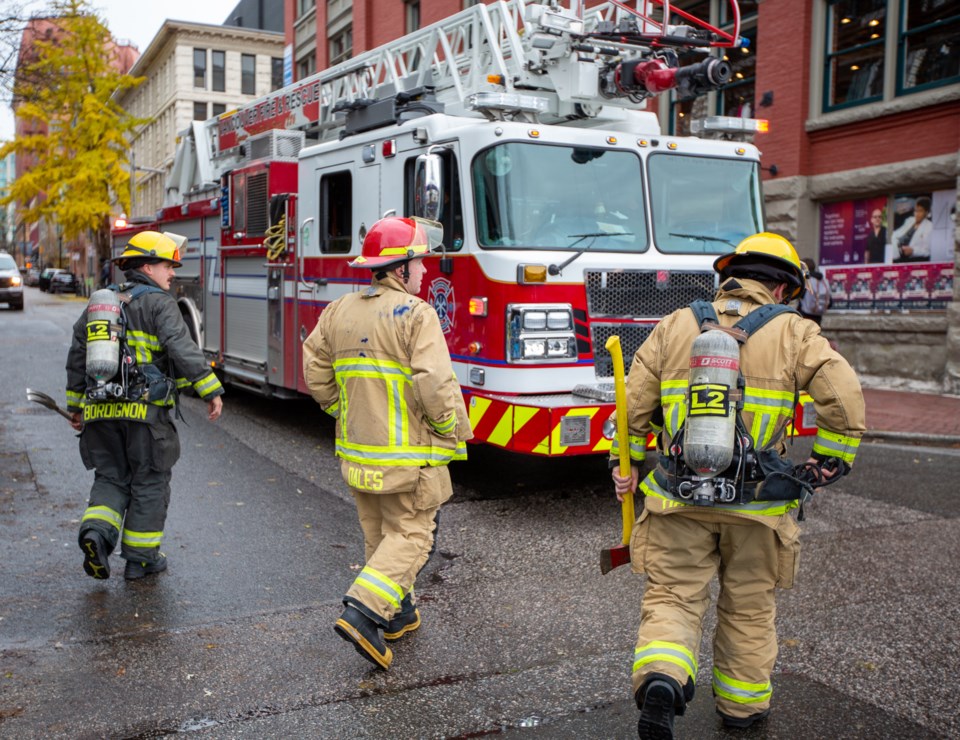B.C. firefighters put their lives on the line every day responding to hazardous calls, and the last thing they should be worried about is their protective gear harming their health.
That’s the premise of a new private member’s bill by Green MLA Adam Olsen, which, if successful, would ban cancer-causing substances in firefighting equipment and foam over the next five years.
“Why not limit the fire suppression foam if there’s a product available and why not drive a market change in the materials they wear when they are responding?” Olsen said in an interview.
“We have a government that is paying attention to these things, and why not put it on the table?”
Almost all modern firefighting turnout gear contains per- and polyfluoroalkyl substances (PFAS), which are a kind of chemical linked to cancer, hormonal changes and other health risks. Fire suppression foam also contains the substance.
Thousands of firefighters in the United States are suing the companies that make the gear and foam, as part of a movement by the International Association of Fire Fighters. The union says cancer is now the leading cause of death for firefighters in the line of duty. Washington state moved to restrict PFAS in firefighting in 2018.
B.C. firefighters are visiting the legislature Tuesday as part of the community’s annual political advocacy day, where they are expected to also pressure the government on the issue.
In Canada, the federal government is considering a ban on so-called “forever chemicals” included in firefighting foam following a draft report into the issue in 2023.
“It’s important to point out in the past we’d send firefighters into burning buildings and their gear didn’t protect them, and now they are much more protected but it’s much more toxic,” said Olsen.
“So there’s this balance that needs to be struck here in protecting them when they are doing the short-term work in fighting the fire but also what is the long-term piece.”
PFAS are most prevalent in turnout gear like boots, coats, pants, gloves and helmets, because the chemicals are embedded in the layers that provide heat protection.
Olsen’s bill calls for B.C. fire departments to ensure 25 per cent of gear is PFAS-free by 2026, rising to 50 per cent by 2027 and 100 per cent by 2029.
In addition, local governments must provide facilities to properly wash and store the protective gear, as well as provide PFAS-free alternatives for less serious calls (such as medical responses) that do not require wearing the full firefighting equipment.
Olsen acknowledged the legislation creates financial and logistical problems for fire departments, because not only is replacing gear expensive but there are currently limited options for safe PFAS-free equipment.
For example, a small rural volunteer fire department likely does not have the wash station and storage facilities to comply. The bill contains fines for municipal governments that fail to adhere.
However, Olsen said the pressure of the timelines would align B.C. with other countries already demanding change from manufacturers, and show support to a cause being waged by firefighters internationally.
“I recognize the added pressure this is going to put financially on fire departments, however, the cost of cleaning facilities and storage facilities is a much lower cost than a potential loss of life of a firefighter,” said Olsen.
“What I’d be calling on the government [to do] is to be removing all financial obstacles from local governments to get the proper facilities built for their fire crews,” he said, suggesting the province create some type of provincial grant program to mitigate the costs.
Olsen said he’s provided his bill to the government for review and intends to table it next week in the house.
B.C. has made some changes to tackle the prevalence of cancer amongst firefighters. It changed the Workers Compensation Act in 2022 so that it would be presumed firefighters who develop certain types of cancer contracted them while working, removing the onus on the firefighter to prove the job was the cause.
Olsen’s proposal on PFAS will need NDP government backing if it is to pass into law. The Ministry of Public Safety said it would review the idea.
“We look forward to seeing the proposed legislation introduced in the house,” the ministry said in a statement.
“Firefighters do heroic work and are always there when people need them.”
Olsen said the cause is worthy of the attention of MLAs at the legislature.
“We know it’s challenging, that is true, and that’s the reason why between now and 2028, hopefully other jurisdictions look at us and say we’re going to join B.C. in this work,” he said.
“Or if it’s a challenge to find an alternative, at the very least we are limiting the use of PFAS-containing turnout gear as much as possible and finding an alternative for our first responders.”
Rob Shaw has spent more than 16 years covering B.C. politics, now reporting for CHEK News and writing for Glacier Media. He is the co-author of the national bestselling book A Matter of Confidence, host of the weekly podcast Political Capital, and a regular guest on CBC Radio.





